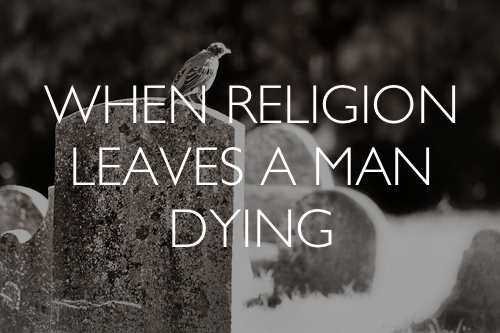
“A man was going down from Jerusalem to Jericho, when he fell into the hands of robbers. They stripped him of his clothes, beat him and went away, leaving him half dead. A priest happened to be going down the same road, and when he saw the man, he passed by on the other side. So too, a Levite, when he came to the place and saw him, passed by on the other side.” - Luke 10:30-32
The priest walks by.
The Levite walks by.
Many of us may look at that and naturally ask the question, “Well, how can the religious leaders leave the man on the side of the road? How can the priest do something like that?” And we think of our own church leaders and pastors and how appalling it would be to see them leave a man dying on the side of the road.
But when the expert in the law hears Jesus telling this story, he would not be surprised at this point. Because as Jesus is telling the story, the expert in the law knows the Hebrew Scriptures very well, and he knows the culture very well, and he knows that what the priest and the Levite do is exactly what priests and Levites do. The expert in the law whom Jesus is telling this story to is familiar with the Levitical laws and the priestly system.
He knows the text:
The Lord said to Moses, “Speak to the priests, the sons of Aaron, and say to them, ‘A priest must not make himself ceremonially unclean for any of his people who die except for a close relative, such as his mother or father, his son or daughter, his brother, or an unmarried sister who is dependent on him since she has no husband. For her, he may make himself unclean. He must not make himself unclean for people related to him by marriage, and so defile himself.” - Leviticus 21:1-4
And like it Leviticus 21:11, which gets more specific about high priests:
“The high priest must not enter a place where there is a dead body. He must not make himself unclean, even for his own father or mother.”
When the expert in the law hears this story, he would not be surprised at the behavior of the Priest and the Levite. They are simply doing what Priests and Levites do. In fact, to this day, Orthodox Jewish priests still avoid going to cemeteries or funerals of people who are not in their family to avoid breaking the Levitical law. And so, as the expert in the hears the story, he is not surprised. Of course the Priest and the Levite don’t help the man on the side of the road, because he was dying. And if he were to die on their watch, they would no longer be able to fulfill their priestly duties. Helping the man on the side of the road would risk their obedience to the law.
And so a man is left dying on the side of the road because a Priest and a Levite are focused on their religious rules.
As the expert in the law hears this story, the question would quickly become, “Where is he going to see himself in the story that Jesus tells?” It’s unlikely that he’s going to see himself as the priest or the Levite. As an expert in the law, he would likely not only be not surprised by the choice of the priest and the Levite, but he would be a little frustrated. He would get the feeling that we get when we turn on the news and see people in the name of the Jesus, declaring or doing things in the name of Jesus that are contrary to his message.
The expert in the law would be thinking, “Here are the religious people; more religious hypocrites, who follow their laws but ignore the law to love your neighbor.” And so as he hears the story, in his frustration, he couldn’t imagine himself as the priest or the Levite.
This only leaves two characters.
Jesus continues the story.
‘But a Samaritan, as he traveled, came where the man was; and when he saw him, he took pity on him. He went to him and bandaged his wounds, pouring on oil and wine. Then he put the man on his own donkey, took him to an inn and took care of him. The next day he took out two silver coins and gave them to the innkeeper. “Look after him,” he said, “and when I return, I will reimburse you for any extra expense you may have.” Which of these three do you think was a neighbor to the man who fell into the hands of robbers?’
Jews despise the Samaritans. Out of anybody in the story that Jesus tells, the last person the expert in the law would resonate with is the Samaritan. The Samaritans were the half-bloods. They are the hated; they didn’t truly follow God. The plot twists in Jesus story as a Samaritan shows up as the hero. This presents a problem for the expert in the law. If he’s not the priest and not the Levite and he’s definitely not the Samaritan, that only leaves one person.
The man dead and dying on the side of the road.
When life and sin leaves us beaten down on the side of the road, where do we turn? In this story, religion leaves a man dead and dying. The religious behavior of the priest and the Levite don’t come to the rescue. They may have been following the rules, but the man on the side of the road was still left for dead. The only one that does anything while we are beaten and dying on the side of the road is the one who is hated, who was despised and rejected. The despised and rejected comes when nothing else could rescue and picks us up, bandages our wounds, and takes us to the inn.

 In a matter of weeks, perhaps days, a tiny little princess will be coming home. We've got her room ready with her chandelier hanging, Cinderella's castle is on the wall, and a Rapunzel lantern on her dresser. I cannot wait to be the dad of a baby girl, which has led to me thinking about what it will be like to have a little princess. I cannot wait. The princess movies, the tea parties, the dancing, and I'm sure there are some other princess details that I haven't even discovered yet. Since I’m in the midst of decorating a room full of princesses, I couldn’t help but think of why I cannot wait to treat my daughter like a princess.
In a matter of weeks, perhaps days, a tiny little princess will be coming home. We've got her room ready with her chandelier hanging, Cinderella's castle is on the wall, and a Rapunzel lantern on her dresser. I cannot wait to be the dad of a baby girl, which has led to me thinking about what it will be like to have a little princess. I cannot wait. The princess movies, the tea parties, the dancing, and I'm sure there are some other princess details that I haven't even discovered yet. Since I’m in the midst of decorating a room full of princesses, I couldn’t help but think of why I cannot wait to treat my daughter like a princess. Dear NFL,
Dear NFL,
 Walt Disney said, “That’s the trouble with the world, too many people grow up.” When we are kids, we can’t wait to get older. When we have kids of our own, we desperately want to cherish the moments we have before they grow up. There’s something incredible about seeing the joy, the innocence, the creativity of a child as they play and imagine. But there are also traits that we hope don’t stick around forever - things like the potty training, the tantrums, needing to have their food mashed up and spoon-fed.
Walt Disney said, “That’s the trouble with the world, too many people grow up.” When we are kids, we can’t wait to get older. When we have kids of our own, we desperately want to cherish the moments we have before they grow up. There’s something incredible about seeing the joy, the innocence, the creativity of a child as they play and imagine. But there are also traits that we hope don’t stick around forever - things like the potty training, the tantrums, needing to have their food mashed up and spoon-fed. I don’t understand runners. I understand playing a sport and being punished with running, but running simply for the fun of it is beyond me. And runners will often talk about the way it makes them feel afterwards - they talk about the adrenaline of the “runner’s high” - this has not ever been my experience. Running typically makes me feel like I would rather die soon. In the few times that I’ve tried to take up running, I’ve ended my running by walking into my house, with my heart pounding through my chest, and thinking, “What in the world did I do that for?"
I don’t understand runners. I understand playing a sport and being punished with running, but running simply for the fun of it is beyond me. And runners will often talk about the way it makes them feel afterwards - they talk about the adrenaline of the “runner’s high” - this has not ever been my experience. Running typically makes me feel like I would rather die soon. In the few times that I’ve tried to take up running, I’ve ended my running by walking into my house, with my heart pounding through my chest, and thinking, “What in the world did I do that for?" God has not called me to play professional basketball. This might be obvious to you, as it should be. I’m hardly tall enough to be a basketball player. My genetics don’t lend themselves very well to me having a fighting chance in the
God has not called me to play professional basketball. This might be obvious to you, as it should be. I’m hardly tall enough to be a basketball player. My genetics don’t lend themselves very well to me having a fighting chance in the  [This is Part 2 in an interview with Ken Chitwood regarding his vocation as a volunteer bartender at a local brewery in Texas. Check out Part 1,
[This is Part 2 in an interview with Ken Chitwood regarding his vocation as a volunteer bartender at a local brewery in Texas. Check out Part 1, 






